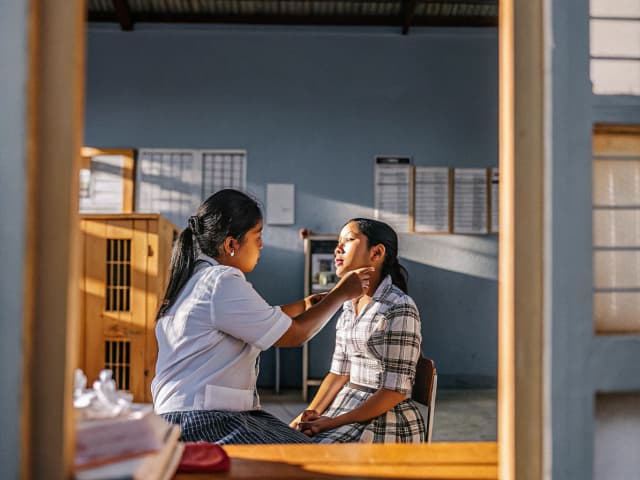Food Assistance & Public Benefits Programs

CalFresh: student eligibility.
Establishes a data-sharing framework to identify CalFresh-eligible students with FERPA protections. Requires separate opt-in consent to share contact data for CalFresh outreach. Repeals the old campus program approval path and adopts a statewide framework. Sets 2026 transition and 2030 reports, outreach starts 2027–28, privacy rules apply.
CalFresh: student eligibility.

Establishes a data-sharing framework to identify CalFresh-eligible students with FERPA protections. Requires separate opt-in consent to share contact data for CalFresh outreach. Repeals the old campus program approval path and adopts a statewide framework. Sets 2026 transition and 2030 reports, outreach starts 2027–28, privacy rules apply.

Disaster CalFresh: county resources: status.
Requires counties to create disaster plans and form mutual aid regions to ensure food assistance during emergencies. Mandates state maintenance of updated disaster materials and applications in all required languages. Establishes procedures for counties to request emergency food benefits during federally declared disasters. Provides counties with free mobile technology to issue emergency benefit cards in disaster-affected areas.
Disaster CalFresh: county resources: status.

Requires counties to create disaster plans and form mutual aid regions to ensure food assistance during emergencies. Mandates state maintenance of updated disaster materials and applications in all required languages. Establishes procedures for counties to request emergency food benefits during federally declared disasters. Provides counties with free mobile technology to issue emergency benefit cards in disaster-affected areas.

Taxation: federal conformity.
Taxation: federal conformity.


Fresh Start Grants: Personal Income Tax Law: credits.
Establishes the Fresh Start Grants Program to replace existing tax credits with direct grant payments starting January 2027. Requires county welfare departments to calculate and distribute grants to eligible CalFresh recipients. Mandates comprehensive data security protocols to protect recipient information, especially for undocumented individuals. Creates a continuously appropriated Fresh Start Grants Fund to ensure sustainable program funding.
Fresh Start Grants: Personal Income Tax Law: credits.

Establishes the Fresh Start Grants Program to replace existing tax credits with direct grant payments starting January 2027. Requires county welfare departments to calculate and distribute grants to eligible CalFresh recipients. Mandates comprehensive data security protocols to protect recipient information, especially for undocumented individuals. Creates a continuously appropriated Fresh Start Grants Fund to ensure sustainable program funding.

CalAccount Program.
Establishes the CalAccount Program to provide Californians with free, federally-insured bank accounts and debit cards. Requires employers with over 10 employees to offer direct deposit into CalAccounts for workers who opt in. Creates a CalAccount Commission to oversee the program and select financial institutions to provide banking services. Mandates landlords to accept rent payments from CalAccounts and prohibits charging fees for electronic transfers.
CalAccount Program.

Establishes the CalAccount Program to provide Californians with free, federally-insured bank accounts and debit cards. Requires employers with over 10 employees to offer direct deposit into CalAccounts for workers who opt in. Creates a CalAccount Commission to oversee the program and select financial institutions to provide banking services. Mandates landlords to accept rent payments from CalAccounts and prohibits charging fees for electronic transfers.

CalWORKs.
Expands CalWORKs by disregarding hours worked for unemployment if income limits are met. Allows aid during strikes and lockouts and includes striker's needs per federal law. Adds self-employment to welfare-to-work activities. Requires feasibility study by Jan 1, 2028 and plans with labor agreements by 2025.
CalWORKs.

Expands CalWORKs by disregarding hours worked for unemployment if income limits are met. Allows aid during strikes and lockouts and includes striker's needs per federal law. Adds self-employment to welfare-to-work activities. Requires feasibility study by Jan 1, 2028 and plans with labor agreements by 2025.

Pupil nutrition: restricted school foods and ultraprocessed foods of concern: prohibition.
Defines ultraprocessed foods of concern and restricted school foods. Phases out restricted foods and ultraprocessed foods by July 1, 2029. Prohibits vendors from supplying restricted foods or ultraprocessed foods by 2032. Requires vendor reports by Feb 1 2028–2032 and annual public reports, and training.
Pupil nutrition: restricted school foods and ultraprocessed foods of concern: prohibition.

Defines ultraprocessed foods of concern and restricted school foods. Phases out restricted foods and ultraprocessed foods by July 1, 2029. Prohibits vendors from supplying restricted foods or ultraprocessed foods by 2032. Requires vendor reports by Feb 1 2028–2032 and annual public reports, and training.

CalFresh: maintenance of benefit level.
Guarantees CalFresh benefits will not fall below January 2025 levels even if federal funding decreases. Authorizes state funds to maintain CalFresh benefit levels when federal funding is insufficient. Requires a feasibility study on expanding CalFresh eligibility and benefits due by January 2027.
CalFresh: maintenance of benefit level.

Guarantees CalFresh benefits will not fall below January 2025 levels even if federal funding decreases. Authorizes state funds to maintain CalFresh benefit levels when federal funding is insufficient. Requires a feasibility study on expanding CalFresh eligibility and benefits due by January 2027.

Public social services.
Reforms welfare fraud penalties by eliminating criminal charges for overpayments under $25,000 in public assistance programs. Requires counties to verify system errors before pursuing fraud cases and prohibits prosecution for administrative mistakes. Mandates qualified caseworker review of all overpayment claims before any collection efforts can begin. Limits overpayment recovery to incidents occurring within the previous 24 months of discovery.
Public social services.

Reforms welfare fraud penalties by eliminating criminal charges for overpayments under $25,000 in public assistance programs. Requires counties to verify system errors before pursuing fraud cases and prohibits prosecution for administrative mistakes. Mandates qualified caseworker review of all overpayment claims before any collection efforts can begin. Limits overpayment recovery to incidents occurring within the previous 24 months of discovery.

CalWORKs: family violence option and gender-based violence information.
Expands waivers for abuse victims to protect safety and escape. Requires uniform statewide information and a standardized waiver form. Establishes protocols by Jan 1, 2027 and operability by 2028 or SWWS readiness. Requires annual reporting on abuse-identified CalWORKs recipients.
CalWORKs: family violence option and gender-based violence information.

Expands waivers for abuse victims to protect safety and escape. Requires uniform statewide information and a standardized waiver form. Establishes protocols by Jan 1, 2027 and operability by 2028 or SWWS readiness. Requires annual reporting on abuse-identified CalWORKs recipients.

Public social services: state of emergency or health emergency.
Guarantees continuous benefits for social services recipients during state emergencies or health crises. Requires counties to automatically extend benefits for at least 90 days during emergencies without requiring paperwork. Mandates immediate benefit restoration for affected recipients who report emergency impacts. Requires agencies to notify recipients about continued eligibility through mail, text, and electronic communications.
Public social services: state of emergency or health emergency.

Guarantees continuous benefits for social services recipients during state emergencies or health crises. Requires counties to automatically extend benefits for at least 90 days during emergencies without requiring paperwork. Mandates immediate benefit restoration for affected recipients who report emergency impacts. Requires agencies to notify recipients about continued eligibility through mail, text, and electronic communications.

Qualified ABLE Program: CalABLE accounts: funding.
Creates the California ABLE Program Trust as a state instrumentality with broad powers. Authorizes grants, gifts, and appropriations for the program fund and administrative fund. Allows targeted outreach to subgroups and partnerships to boost participation. Requires tax form instructions to show direct deposits to ABLE and Scholarshare.
Qualified ABLE Program: CalABLE accounts: funding.

Creates the California ABLE Program Trust as a state instrumentality with broad powers. Authorizes grants, gifts, and appropriations for the program fund and administrative fund. Allows targeted outreach to subgroups and partnerships to boost participation. Requires tax form instructions to show direct deposits to ABLE and Scholarshare.

CalWORKs.
Updates CalWORKs to allow aid when a child lives with the parent without removing all children. Sets SAWS-driven operative date and bans retroactive payments. Allows reunification to satisfy welfare-to-work with a CalWORKs plan or CW services and CalWORKs plan. Exempts immunization requirements for reunification plans and notes local costs.
CalWORKs.

Updates CalWORKs to allow aid when a child lives with the parent without removing all children. Sets SAWS-driven operative date and bans retroactive payments. Allows reunification to satisfy welfare-to-work with a CalWORKs plan or CW services and CalWORKs plan. Exempts immunization requirements for reunification plans and notes local costs.

California Food Assistance Program: sponsor deeming rules.
Removes federal income eligibility rules from the California Food Assistance Program for immigrants. Requires counties to develop new procedures for determining food assistance eligibility. Mandates state reimbursement to counties for costs of implementing the new eligibility rules.
California Food Assistance Program: sponsor deeming rules.

Removes federal income eligibility rules from the California Food Assistance Program for immigrants. Requires counties to develop new procedures for determining food assistance eligibility. Mandates state reimbursement to counties for costs of implementing the new eligibility rules.

State-funded assistance grants and contracts: advance payments.
Requires state agencies to provide advance payments for all grants and contracts advertised after January 1, 2026. Mandates disclosure of advance payment percentages in all grant solicitations and registrations. Limits advance payments to 25% of total grant funds unless recipients justify a larger amount. Requires recipients to submit quarterly progress reports and return any unused advance funds.
State-funded assistance grants and contracts: advance payments.

Requires state agencies to provide advance payments for all grants and contracts advertised after January 1, 2026. Mandates disclosure of advance payment percentages in all grant solicitations and registrations. Limits advance payments to 25% of total grant funds unless recipients justify a larger amount. Requires recipients to submit quarterly progress reports and return any unused advance funds.

CalFresh Fruit and Vegetable Supplemental Benefits Program.
Establishes a permanent program providing bonus CalFresh benefits for fruit and vegetable purchases. Requires retailers to integrate supplemental benefits into their existing payment systems. Creates a grant fund to help small retailers implement the program technology. Mandates quarterly public reporting of program usage and benefit distribution data.
CalFresh Fruit and Vegetable Supplemental Benefits Program.

Establishes a permanent program providing bonus CalFresh benefits for fruit and vegetable purchases. Requires retailers to integrate supplemental benefits into their existing payment systems. Creates a grant fund to help small retailers implement the program technology. Mandates quarterly public reporting of program usage and benefit distribution data.

Nonminor dependents: county of residence.
Introduces a cross-county transfer mechanism for nonminor dependents based on best interests. Requires transfer order within 30 court days and new county gains jurisdiction within 10 days. Requires court to consider transfer during reviews and in reports for nonminors. Adds criteria for evaluating transfer: access to services, residency eligibility, connections.
Nonminor dependents: county of residence.

Introduces a cross-county transfer mechanism for nonminor dependents based on best interests. Requires transfer order within 30 court days and new county gains jurisdiction within 10 days. Requires court to consider transfer during reviews and in reports for nonminors. Adds criteria for evaluating transfer: access to services, residency eligibility, connections.

State government grants and contracts: payment of claims and grantees’ indirect costs.
Requires state agencies to reimburse nonprofits' indirect costs in grant programs at federally approved rates. Mandates penalties for state agencies that fail to pay grant claims within 45 days of receiving undisputed invoices. Establishes standardized reimbursement options for indirect costs across all state grant programs. Requires annual reporting of late payment penalties paid to businesses and nonprofits by state agencies.
State government grants and contracts: payment of claims and grantees’ indirect costs.

Requires state agencies to reimburse nonprofits' indirect costs in grant programs at federally approved rates. Mandates penalties for state agencies that fail to pay grant claims within 45 days of receiving undisputed invoices. Establishes standardized reimbursement options for indirect costs across all state grant programs. Requires annual reporting of late payment penalties paid to businesses and nonprofits by state agencies.

State Healthy Food Access Policy.
Establishes a state policy guaranteeing access to locally grown, affordable, and healthy food for all residents. Requires state agencies to incorporate local food sourcing into their policies and grant criteria. Mandates agencies to report their implementation progress to the Legislature by January 2027.
State Healthy Food Access Policy.

Establishes a state policy guaranteeing access to locally grown, affordable, and healthy food for all residents. Requires state agencies to incorporate local food sourcing into their policies and grant criteria. Mandates agencies to report their implementation progress to the Legislature by January 2027.

Community Violence Interdiction Grant Program.
Establishes a new grant program to fund local community initiatives that reduce neighborhood and school violence. Prioritizes funding for areas most impacted by violence and gang activity through competitive grants. Creates school-based health centers and youth intervention programs during peak violence periods. Funds the program using savings generated from state prison closures starting July 2026.
Community Violence Interdiction Grant Program.

Establishes a new grant program to fund local community initiatives that reduce neighborhood and school violence. Prioritizes funding for areas most impacted by violence and gang activity through competitive grants. Creates school-based health centers and youth intervention programs during peak violence periods. Funds the program using savings generated from state prison closures starting July 2026.

Stop Child Hunger Act of 2025.
Requires a statewide Summer EBT online application contingent on appropriation. Routes completed applications to local educational agencies to determine eligibility. Expands FRPM online access with privacy protections and essential program links. Requires translation into threshold CalFresh languages and devices for families on request.
Stop Child Hunger Act of 2025.

Requires a statewide Summer EBT online application contingent on appropriation. Routes completed applications to local educational agencies to determine eligibility. Expands FRPM online access with privacy protections and essential program links. Requires translation into threshold CalFresh languages and devices for families on request.

Pupil health: school nutrition.
Makes technical changes to state declarations about school meal nutrition standards.
Pupil health: school nutrition.

Makes technical changes to state declarations about school meal nutrition standards.

Office of Farm to Fork: California Farm to School Program.
Establishes the California Farm to School Program to connect local farms with school meal programs. Requires schools to increase procurement of California-grown foods for student meals. Creates a grant program to support farm-to-school initiatives and hands-on food education. Establishes a dedicated Farm to School Account to fund program activities through various sources.
Office of Farm to Fork: California Farm to School Program.

Establishes the California Farm to School Program to connect local farms with school meal programs. Requires schools to increase procurement of California-grown foods for student meals. Creates a grant program to support farm-to-school initiatives and hands-on food education. Establishes a dedicated Farm to School Account to fund program activities through various sources.

The California Guaranteed Income Statewide Feasibility Study Act.
Requires California to study implementing a permanent statewide guaranteed income program by 2028. Establishes a steering committee of program operators and participants to guide research and recommendations. Mandates data sharing between state agencies to analyze impacts on vulnerable populations. Prioritizes funding for groups including foster youth, domestic violence survivors, and low-income seniors.
The California Guaranteed Income Statewide Feasibility Study Act.

Requires California to study implementing a permanent statewide guaranteed income program by 2028. Establishes a steering committee of program operators and participants to guide research and recommendations. Mandates data sharing between state agencies to analyze impacts on vulnerable populations. Prioritizes funding for groups including foster youth, domestic violence survivors, and low-income seniors.

Emergencies proclaimed by the Governor: school employee catastrophic leave.
Expands school employee leave donation programs to include charter schools and state emergency situations. Allows employees to donate vacation and sick leave in minimum eight-hour increments to affected colleagues. Requires employees to exhaust their own paid leave before using donated leave credits. Limits the use of donated leave to a maximum of 12 consecutive months.
Emergencies proclaimed by the Governor: school employee catastrophic leave.

Expands school employee leave donation programs to include charter schools and state emergency situations. Allows employees to donate vacation and sick leave in minimum eight-hour increments to affected colleagues. Requires employees to exhaust their own paid leave before using donated leave credits. Limits the use of donated leave to a maximum of 12 consecutive months.